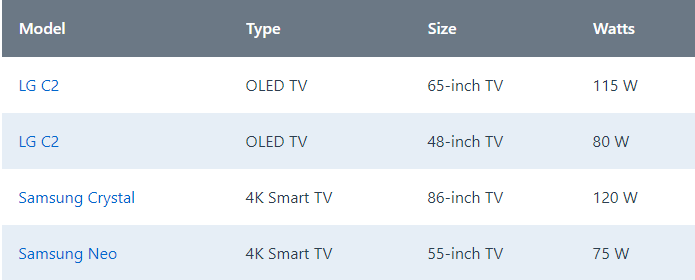How much electricity does a TV use?
The amount of electricity a TV uses, or its wattage (W) depends on a few different factors, such as the size, what the TV is being used for (like for watching a show or playing video games), and the fact that TVs do in fact use energy when they are turned off and still plugged in.
The average amount of electricity a TV uses is about 100 W, but you can find the exact information in its specifications sheet (they’re usually online), in the owner's manual, or by looking at a sticker on the TV itself.
If you are using a TV with stored electricity from a battery during a power outage, you might not want to binge-watch 10 hours of your new favorite Netflix series. Most storage batteries hold 10 kWh of electricity, and watching 10 hours of TV would use about 1 kWh.
While that doesn’t seem like a lot, you want to be more cautious with your energy usage when you’re running on backup power. Instead, cut down on the TV use and leave that energy available to keep the food in your fridge cold.
Do TVs use electricity when they’re off?
Yes, like all electronics, TVs remain on standby mode.
Any piece of technology that is plugged in will be drawing a minimal amount of electricity from the outlet because it is always ready to be turned on. However, the energy that is used to keep electronics running is pretty minimal, using less than 0.5 W of standby power.
So perhaps if you are experiencing a power outage and need to rely on battery storage, unplug your TV unless it is an essential load. Otherwise, on a normal day, keeping your TV plugged in will not cause an extreme increase in your electric bill.
How much does it cost to run a tv?
A TV does not cost a lot of money to run. The average electricity cost is about 13.01 cents per kWh, and there are 1,000 watt-hours in a kilowatt hour. So if you watched your TV for 10 hours a day, that would get you to that 13 cents.
While this price can of course fluctuate based on your local electricity rates and the number of hours you watch TV, it’s not something to really worry about when it comes to your energy bill.
How do different TV models compare in their wattages?
The size, screen size, and type of TV will dictate the amount of energy it needs to function. There are a few different kinds of TV models, including LED/LCD, plasma, and smart TVs, all of which use varying amounts of wattage to work.
LED and LCD TVs use essentially the same LED lights to run, which is why we are grouping them together. Plasma TVs use more LED lights than a traditional LED TV. Smart TVs use a similar amount to LEDs, and they also have the ability to connect to the internet.
The typical power consumption can range, depending on the size and type of the TV. However, it is safe to assume that 100 W of power consumption is around what you can expect from a modern TV.
To give you a frame of reference, we’ve rounded up top TV brands and sizes below.
Table 1. Popular TV models and their wattages

*TIP: When shopping for a new TV, look for energy-efficient models with an Energy Star rating if you are mindful about electricity consumption.
Solar, battery storage, and your TV
Knowing your TV wattage is probably only relevant if you need to determine how much electricity you need for running a TV on either stored energy or with little energy, like within an RV.
If you have solar storage for when the power goes out, just be aware that the energy it has stored cannot keep all of your household appliances powered at once. As in, you can’t have the air conditioner running, an electric stove cooking, a washing machine going, and the TV on.
With that said, if your TV is something that you want to use during a power outage, just be sure to include its wattage in your essential load calculation.
When it comes to solar panels, just know that the person installing them will take your average electrical usage into consideration when they recommend a solar system size. You can find reputable solar installers on our site that will help you determine the right solar system for your unique needs.



.jpg)